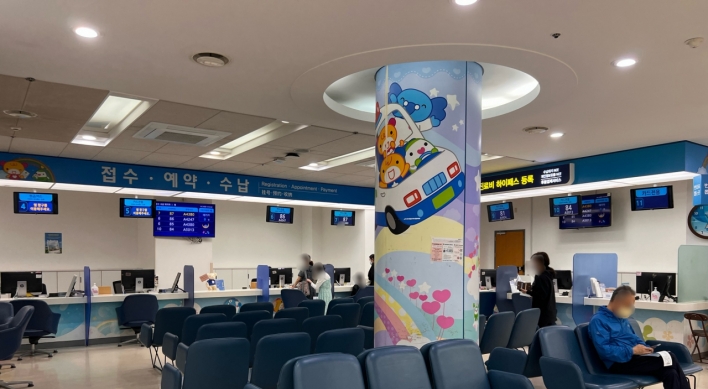When her husband killed himself six years ago, Setsuko Nanbu could not tell others that he had committed suicide. Instead, she said he died of heart attack.
“Suicide was a social taboo. I myself had prejudice against it. I lied so as not to disgrace my husband’s honor,” said the Japanese woman, now in her 60s.
She was speaking, sometimes tearfully, during a Korea-Japan symposium held early this week in Seoul to support those who have suffered a suicide in the family.
A week after going missing back in 2004, her husband jumped onto the railroad near an apartment complex where the couple lived as newlyweds. He was 58.

According to Statistics Korea, a total of 99,321 suicides have been committed over the past 10 years. Police estimate the actual figure could reach 140,000.
These suicides left nearly 600,000 family members behind.
In 2008, Korea’s suicide rate of 26 per every 100,000 people was the highest among OECD member states and more than double the average.
With a rapidly increasing suicide rate, and more recently celebrity suicides and group suicides, Korean society has started recognizing the seriousness of the issue and the necessity of prevention.
However, prejudice toward people who commit suicide and their families is still prevalent, making it hard for them to receive proper help.
A Korean mother, whose then 22-year-old son killed himself in 2008, also shared her story with the audience during the symposium. She didn’t reveal her name, saying “she was reluctant to speak in front of you until yesterday.”
After years of suffering from tuberculosis, her son was experiencing severe depression and jumped off the apartment block where the family lived.
“People can say so easily that the family may have a huge problem or the person may be lazy, weak-willed and even selfish. They see us like criminals. But my son and family are just ordinary people,” she said.
She also expressed sympathy for late Choi Jin-young, an actor and singer who hanged himself on March 29, just a year and a half after his older sister, actress Choi Jin-sil, killed herself in 2008.
“At the time, people blamed his suicide, saying he should have taken care of the nephews that his older sister left behind. A friend said unintentionally that their mother didn’t teach her children properly.
“But I can understand the feelings that Choi Jin-young might have gone through. I also missed my son and felt guilty for not protecting him. Because the sadness was too severe, I once hoped to get sick to death,” she said.
Experts say that losing a loved one by suicide causes much more complicated emotions among the bereaved family members than deaths from natural causes.
“Unanswered questions are left after suicide. Families feel guiltier, self-accusation and responsibility. Then, the feelings turn into anger that the deceased person abandoned them,” said Kim Yong-boon, professor of Chunnam Techno College, who conducted research on their bereavement by interviewing 10 people.
Kim said that early response to the bereaved family members is very important in order to prevent another suicide.
According to the study results, parents were likely to kill themselves within one month of their child’s suicide. If a child experiences a suicide of one family member, he or she is more likely to commit suicide when grown up, she said.
She also said that the family members felt a greater consolation by communicating with those who have similar experiences, proposing that their community activities be supported by related organizations.
The two women who shared their stories in the day were also getting help by joining such activities prepared by civic groups.
“I finally realized that to lie about my husband’s death is to lie about his whole life that he enthusiastically lived. I hope my activity can help others get consolation,” said Setsuko Nanbu.
Amid no apparent progress witnessed in the Korean government’s recent efforts, some lawmakers have proposed a suicide prevention bill in recent years. A bill submitted by Rep. Im Doo-sung of the ruling Grand National Party is still pending at a parliamentary standing committee.
In 2006, the Japanese parliament passed a suicide prevention law and after a campaign led by Yasuyuki Simizu, a Japanese anti-suicide campaigner.
“Even though the issue of suicide has long been a social problem in Japanese society since the late 1990s, no meaningful measures were taken by the government,” he told The Korea Herald.
“The introduction of the suicide prevention law created a great sensation at the time.”
He, then producer of the Japanese broadcaster NHK, raised the issue in 2001 in his program where children whose parents committed suicide revealed their real names and faces and talked about their stories.
“The most important achievement after the adoption of the law is that we can conduct research on the actual situation and lay out follow-up prevention measures,” he said. He is now running the non-profit organization Life Link and advising on the Japanese government policy related to suicide.
He faces some difficulties in persuading government officials to establish related policies, he said, because many people still consider suicide an individual issue, not a national affair.
“I believe, however, people’s minds are definitely changing (since the new law),” he said.
When Prime Minister Yukio Hatoyama took office in September, he pledged to make suicide prevention a top policy priority. The Japanese government has earmarked about $175 million for research, mental health services, job training for the unemployed, education, debt-counseling and help lines.
The annual number of suicides in Japan is estimated at 30,000. The country’s suicide rate is 25.3 per 100,000 people, slightly lower than the Korean figure of 26.
The budget of the Korean government is estimated at 1.3 billion won ($1 million) this year.
By Lee Ji-yoon (jylee@heraldcorp.com)
“Suicide was a social taboo. I myself had prejudice against it. I lied so as not to disgrace my husband’s honor,” said the Japanese woman, now in her 60s.
She was speaking, sometimes tearfully, during a Korea-Japan symposium held early this week in Seoul to support those who have suffered a suicide in the family.
A week after going missing back in 2004, her husband jumped onto the railroad near an apartment complex where the couple lived as newlyweds. He was 58.

According to Statistics Korea, a total of 99,321 suicides have been committed over the past 10 years. Police estimate the actual figure could reach 140,000.
These suicides left nearly 600,000 family members behind.
In 2008, Korea’s suicide rate of 26 per every 100,000 people was the highest among OECD member states and more than double the average.
With a rapidly increasing suicide rate, and more recently celebrity suicides and group suicides, Korean society has started recognizing the seriousness of the issue and the necessity of prevention.
However, prejudice toward people who commit suicide and their families is still prevalent, making it hard for them to receive proper help.
A Korean mother, whose then 22-year-old son killed himself in 2008, also shared her story with the audience during the symposium. She didn’t reveal her name, saying “she was reluctant to speak in front of you until yesterday.”
After years of suffering from tuberculosis, her son was experiencing severe depression and jumped off the apartment block where the family lived.
“People can say so easily that the family may have a huge problem or the person may be lazy, weak-willed and even selfish. They see us like criminals. But my son and family are just ordinary people,” she said.
She also expressed sympathy for late Choi Jin-young, an actor and singer who hanged himself on March 29, just a year and a half after his older sister, actress Choi Jin-sil, killed herself in 2008.
“At the time, people blamed his suicide, saying he should have taken care of the nephews that his older sister left behind. A friend said unintentionally that their mother didn’t teach her children properly.
“But I can understand the feelings that Choi Jin-young might have gone through. I also missed my son and felt guilty for not protecting him. Because the sadness was too severe, I once hoped to get sick to death,” she said.
Experts say that losing a loved one by suicide causes much more complicated emotions among the bereaved family members than deaths from natural causes.
“Unanswered questions are left after suicide. Families feel guiltier, self-accusation and responsibility. Then, the feelings turn into anger that the deceased person abandoned them,” said Kim Yong-boon, professor of Chunnam Techno College, who conducted research on their bereavement by interviewing 10 people.
Kim said that early response to the bereaved family members is very important in order to prevent another suicide.
According to the study results, parents were likely to kill themselves within one month of their child’s suicide. If a child experiences a suicide of one family member, he or she is more likely to commit suicide when grown up, she said.
She also said that the family members felt a greater consolation by communicating with those who have similar experiences, proposing that their community activities be supported by related organizations.
The two women who shared their stories in the day were also getting help by joining such activities prepared by civic groups.
“I finally realized that to lie about my husband’s death is to lie about his whole life that he enthusiastically lived. I hope my activity can help others get consolation,” said Setsuko Nanbu.
Amid no apparent progress witnessed in the Korean government’s recent efforts, some lawmakers have proposed a suicide prevention bill in recent years. A bill submitted by Rep. Im Doo-sung of the ruling Grand National Party is still pending at a parliamentary standing committee.
In 2006, the Japanese parliament passed a suicide prevention law and after a campaign led by Yasuyuki Simizu, a Japanese anti-suicide campaigner.
“Even though the issue of suicide has long been a social problem in Japanese society since the late 1990s, no meaningful measures were taken by the government,” he told The Korea Herald.
“The introduction of the suicide prevention law created a great sensation at the time.”
He, then producer of the Japanese broadcaster NHK, raised the issue in 2001 in his program where children whose parents committed suicide revealed their real names and faces and talked about their stories.
“The most important achievement after the adoption of the law is that we can conduct research on the actual situation and lay out follow-up prevention measures,” he said. He is now running the non-profit organization Life Link and advising on the Japanese government policy related to suicide.
He faces some difficulties in persuading government officials to establish related policies, he said, because many people still consider suicide an individual issue, not a national affair.
“I believe, however, people’s minds are definitely changing (since the new law),” he said.
When Prime Minister Yukio Hatoyama took office in September, he pledged to make suicide prevention a top policy priority. The Japanese government has earmarked about $175 million for research, mental health services, job training for the unemployed, education, debt-counseling and help lines.
The annual number of suicides in Japan is estimated at 30,000. The country’s suicide rate is 25.3 per 100,000 people, slightly lower than the Korean figure of 26.
The budget of the Korean government is estimated at 1.3 billion won ($1 million) this year.
By Lee Ji-yoon (jylee@heraldcorp.com)





![[Grace Kao] Hybe vs. Ador: Inspiration, imitation and plagiarism](http://res.heraldm.com/phpwas/restmb_idxmake.php?idx=644&simg=/content/image/2024/04/28/20240428050220_0.jpg&u=)
![[Herald Interview] Mom’s Touch seeks to replicate success in Japan](http://res.heraldm.com/phpwas/restmb_idxmake.php?idx=644&simg=/content/image/2024/04/29/20240429050568_0.jpg&u=)


![[News Focus] Lee tells Yoon that he has governed without political dialogue](http://res.heraldm.com/phpwas/restmb_idxmake.php?idx=644&simg=/content/image/2024/04/29/20240429050696_0.jpg&u=20240429210658)








![[Today’s K-pop] Seventeen sets sales record with best-of album](http://res.heraldm.com/phpwas/restmb_idxmake.php?idx=642&simg=/content/image/2024/04/30/20240430050818_0.jpg&u=)